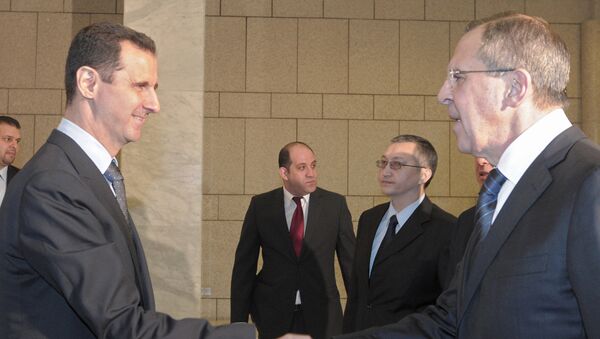On February 7, Russia’s Foreign Minister Sergei Lavrov and Foreign Intelligence Service Director Mikhail Fradkov traveled to Damascus to help stabilize the situation in Syria by encouraging democratic reforms. The substance of President Dmitry Medvedev’s letter, which they delivered to Bashar al-Assad, was not disclosed, but experts point to the highly delicate nature of the Russian officials’ mission.
A delicate mission
Syrians chanted “Thank you, Russia!” as Lavrov and Fradkov were whisked through the streets of Damascus for talks with the Syrian president and a news briefing. Lavrov said after the meeting that the visit to Damascus had been timely and useful. “There are grounds for assuming that our signal, urging more active movement in all directions, has been heard,” he said.
But what kind of signal could that be?
Ahead of the visit, many Russian analysts assumed that Lavrov had been tasked with a very delicate mission: to convince al-Assad to resign and transfer power to Vice President Farouk al-Sharaa, which is what the Arab League’s political settlement plan is proposing.
Most likely, the Russian envoys gave the Syrian president an ultimatum: either launch democratic reforms immediately in exchange for the continued support of Moscow, or step down. This was indirectly confirmed by Lavrov’s statement at a news briefing regarding the drafting of a new Syrian constitution.
“President al-Assad has told us that in the next few days he will meet with the commission that was drafting a new constitution,” Lavrov said. “It has completed its work and the date for a referendum on this crucial document for Syria will be announced soon.”
Friends stick together?
In fact, the visit has reaffirmed Russia’s readiness to stand up to the West and the Arab League in defense of its last remaining ally in the Middle East. The question is, how far is Russia prepared to go in this confrontation, and what political dividends does it expect to reap?
Vladimir Putin said repeatedly during his two presidential terms (2000-2008) that Russia would develop relations with Arab countries on an economic, not an ideological, basis.
True to his word, Russia was actively trying to develop relations with Saudi Arabia and other oil-rich Gulf monarchies in the mid-2000s. But simultaneously it was also signing major arms contracts with Algeria and Libya.
Syria was no exception, but trade with Syria was on a smaller scale than with other Arab countries. Now that Syria has become a bone of contention between Russia and the rest of the Arab world (apart from Iraq and Lebanon), Moscow is facing a difficult choice.
What Russia stands to gain and lose
They say that politics is the art of the possible, but the outbreak of civil war in Syria, which Russian diplomats prefer not to notice, has greatly undermined the room for political maneuver in Moscow and Damascus.
If Bashar al-Assad stays in power, which seems highly unlikely, Russia’s economic and military contracts with Syria will be safe. It will able to supply weapons to Syria, although most likely against deferred payment, as happened during the Soviet era.
By the time the Soviet Union collapsed in 1991, Syria’s debts, by various estimates, amounted to $10 or $13 billion. In 2005, Russia wrote the debts off in the hope of signing new contracts. In 2009, trade turnover between Russia and Syria amounted to less than $1 billion. The European Union has recently approved economic sanctions against Syria and is considering adopting new, harsher sanctions. Russia, China and Iran are Syria’s last hope, but they are not omnipotent.
If the al-Assad regime falls, Russia will lose Syria, irrespective of who takes over, because the entire Syrian opposition, both inside and outside the country, is set against Russia. Islamic fundamentalists have already attacked Russian embassies in Sudan and Libya.
But even if pro-Western liberals, supported by France, Britain and the United States, assume power, they will most likely opt to do business with Western companies. Russian weapons will be replaced by U.S. and French models, as happened in Egypt nearly 40 years ago.
So far, developments in Syria have not turned out favorably for Russia. Following the example of the West, six Gulf countries – Bahrain, Kuwait, Oman, Qatar, Saudi Arabia and the United Arab Emirates – recalled their ambassadors from Syria on February 7. Russia’s relations with these countries are rapidly deteriorating, which means that all Russian economic contracts with the Gulf states could be suspended or terminated altogether at any time.
But it is not weapons, or even economic contracts, that matter most. Confrontation with both Arab and Western countries would greatly damage Russia’s hard-won international image as a democratic state.
The United States and its European partners, including German Chancellor Angela Merkel and French President Nicolas Sarkozy, have sharply criticized Russia’s stance on Syria. So the question is, is the Syrian game worth playing?
The views expressed in this article are the author's and may not necessarily represent those of RIA Novosti.

